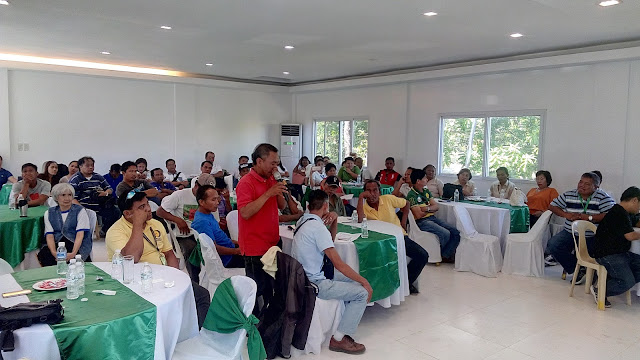DEMOCRACY IN PRACTICE
Democracy is not something that popped out of thin air. The concept and practice of democracy evolved and continues to progress through social processes. While the development of the concept comes naturally with the advancement of human society, the contents and benefits of democracy are not readily available. The people can only claim the space for participation, criticism, and dissent it provides through organized assertion and ardent struggle.
The March 27 dialogue between the tobacco farmers led by Solidarity of Peasants Against Exploitation (Stop Exploitation) and the National Tobacco Administration (NTA) headed by Dr. Robert Seares in Dolores, Abra is a good example.
The negotiation was an offshoot of the letter forwarded by the organization to NTA and a picket at the agency’s Candon City Branch Office a few days before the meeting. The organization’s credibility and confidence to raise farmers’ issues in the region rests on its two decades of militant struggle for farmers’ rights and welfare. Stop Exploitation took on the task of educating, organizing, and mobilizing tobacco farmers since 1988. Its local and national campaigns brought into national attention the dismal state of tobacco farmers in contrast to the billions of profit of tobacco companies, and affluent lifestyle of Northern Luzon politicians.
Stop Exploitation’s contribution to the advancement of the tobacco industry and farmers’ welfare, compelled then NTA Administrator Edgardo Zaragosa to recognize the federation as an independent farmers’ representative in the National Tobacco Tripartite Conference (NTTC). Before the group’s participation to the NTTC, farmers’ representatives were composed of those under the contract farming program of the different tobacco companies and trading centers, or the NTA. The previous administration also allowed STOP Exploitation to visit trading centers during tobacco selling season to monitor farmers’ grievances.
Stop Exploitation’s participation gave more credence and semblance of democracy to the NTTC, however, it did not diminish its bias for the private sector nor paved the way for the agency to progressively address the farmers’ concerns. What little semblance of democracy left in the NTTC processes may disappear with the new NTA leadership that gave an impression during the talks that they were not interested to continue the crucial participation of grassroot stakeholders, taking the agency many steps backward.
The agency’s failure to address production troubles of tobacco farmers likewise became more evident when one by one, farmers from different municipalities expressed their issues during the dialogue. Long-standing issues such as low price, onerous contracts, numerous grading levels, unfinished or non-functional projects, meager government support remained to be their top complaints.
As expected, the NTA officials gave the standard answers – that they will “look into” the complaints of farmers and “still have to talk about” their demands for better contract terms and sufficient government support. Besides these motherhood statements, evading the issue tactics, the agency leaders also played the “blame game”, throwing cheap shots at the farmers’ representatives. One member of the board in particular claimed that without the exploitative grading system, farmers will become lazy; and that farmers may intentionally burn their own curing barns and claim insurance in the name of a force majeure.
Honed by practice and years of exploitation, the leaders of Stop Exploitation stood their ground, answered all the questions thrown at them with facts, clear examples and narration of actual experiences. Realizing that they were facing veteran and well-informed peasant leaders, the NTA ended the dialogue without presenting any concrete plan of action to resolve the farmers’ concerns.
The entire proceeding highlighted that democracy, as practice in our current society is nothing but token used to appease the people like the carrot and stick approach. It only proves how dysfunctional the current government bureaucracy is. The whole meeting only showcased once more that a change in leadership does not necessarily change the decadent system of governance and the oppressive state it represents. Democracy is earned and defended in a continuing struggle to rise above being oppressed and exploited by the few. # ##



Comments
Post a Comment